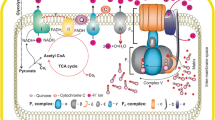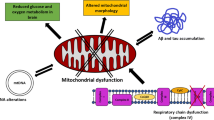ABSTRACT
Abnormalities in cellular bioenergetics have been identified in patients with Alzheimer's disease (AD) as well as in patients with other neurodegenerative diseases. The most commonly reported enzyme abnormalities are in the pyruvate dehydrogenase complex, the α-ketoglutarate dehydrogenase complex, and oxidative phosphorylation (OXPHOS). Although genetic evidence supporting primary OXPHOS defects as a cause for AD is weak, functionally important reductions in OXPHOS enzyme activities appear to occur in AD and may be related to β-amyloid accumulation or other neurodegenerative processes. Since reduced neuronal ATP may enhance susceptibility to glutamate toxicity, OXPHOS defects could play an important role in the pathophysiology of AD.
Similar content being viewed by others
Author information
Authors and Affiliations
Additional information
Received February 6, 1997; Revised and Accepted February 21, 1997
Rights and permissions
About this article
Cite this article
Shoffner, J. Oxidative phosphorylation defects and Alzheimer's disease. Neurogenetics 1, 13–19 (1997). https://doi.org/10.1007/s100480050002
Issue Date:
DOI: https://doi.org/10.1007/s100480050002




